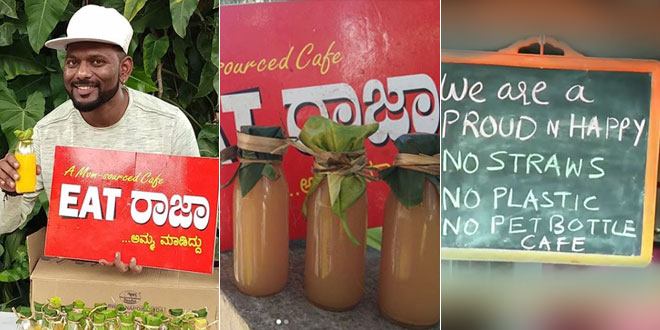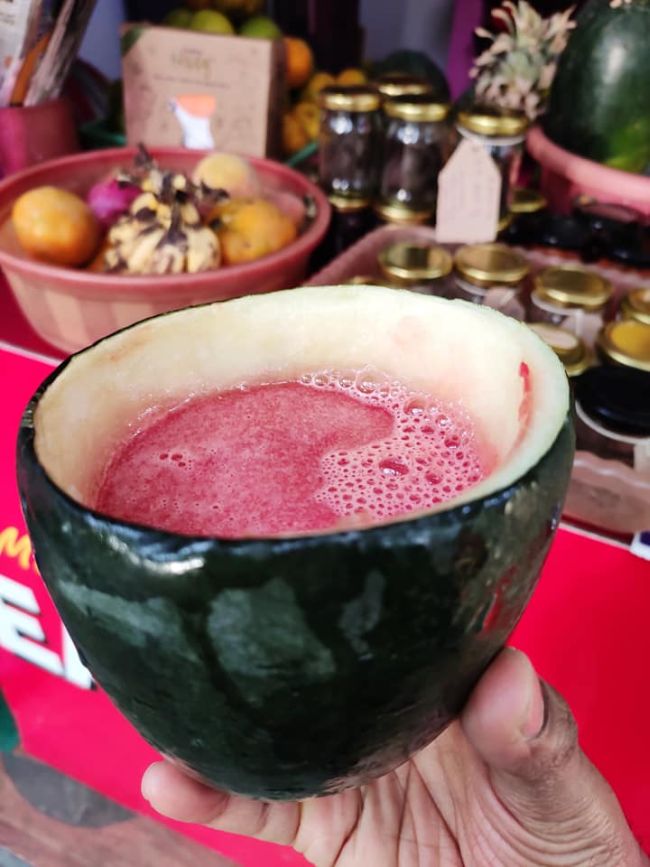New Delhi: ‘I went to the juice corner to get myself a freshly made pineapple drink, after seeing the way this humble juice corner worked, I was left so motivated that from the very next day I started waste segregation at home,’ said 31-year-old Deepa, one of the customers of Eat Raaja, a zero-waste juice corner located between two temples in Malleswaram, a place dedicated to Lord Shiva in the electronic city of Bengaluru. A juice corner that is giving people a lesson on proper waste management and segregation of garbage in wet or biodegradable and dry or non-biodegradable, with the sole aim of reducing the quantity of trash generated to almost zero. Another customer to Eat Raaja, Swaroop MN says “It was so fascinating to know that a juice corner located near my house is not sending any waste to the already dying landfills of the country. It motivated me so much that I started following good waste management habits back home.”
Eat Raaja’s zero-waste policy is all thanks to Anand Raaj, who quit his flourishing 12-year-old career in radio behind the mic and decided to take over the reins of his family juice shop.
Also Read: Bengaluru Couple Adopts ‘Reduce, Reuse, Recycle’ To Convert 6,000 Newspapers Into 20,000 Pencils
https://www.instagram.com/p/BlpI_KcHkLh/
Talking to NDTV about his journey, Raaj said,
For the past 45 years, my father was taking care of the juice shop. Over these years, I was building a successful career as a radio jockey, as I always wanted to be one. But last year, an unforced event took place, my father passed away and the responsibility to run the juice corner came to me. I decided to quit my job and start afresh. Being a radio jockey, I have interviewed many environmentalists and warriors who were doing something or the other for the environment. I was always very impressed by their deeds. When responsibilities came by and I had to make a big switch from being an RJ jockey to a businessman, one thing that I was very sure of was to start this business with a unique concept.
And this very thought of having a USP or unique selling point gave Anand the idea of adopting and putting into practice the motto of zero-waste. He kick-started the journey by renaming the juice corner as ‘Eat Raaja’ with a tagline ‘made by mom’ as he wanted to initiate his mom into the business along with him. The motto was to allow one to devour the taste of mom-cooked recipes thereby promoting the concept that mothers place is not just in the kitchen but outside it as well. Anand adds,
I decided to include my mom into the business as I have always seen her asking for money from my dad – even for small things like buying cookies. I wanted her to make money for herself and use it by her choice. That is when I decided on the concept of ‘Eat Raaja’ that means whatever you will get here will be mom-made. Secondly, I had seen how my father used to generate a lot of waste – be it in terms of cups, straws, PET bottles and carry bags. When I took over, I decided to get rid of this legacy of waste and that’s how the journey from being a humble juice shop to Bengaluru’s first zero-waste juice corner took place.
Also Read: 58-Year-Old Woman From Nashik Takes On Newspaper Waste, Converts It Into Dolls
Steps Taken To Make Eat Raaja, A Zero-Waste Juice Shop
https://www.instagram.com/p/Bk2euoRneJ2/
As a first step, Raaj decided to clean-up the existing waste from the juice shop and stop the use of all things plastic. “I just couldn’t throw the existing plastic into the dustbin because now the juice shop needs to be zero-waste. That’s not called managing the waste effectively, nor could I make use of it anymore. So, as one of the initial steps, I decided to give all the dry or plastic waste from the juice corner to Bengaluru’s Dry Waste Centre – they help in effective recycling,” added Raaj.
Then Raaj removed the PET bottles from the juice corner, which he tags as one of his most difficult business choices as removal of PET Bottles meant not only doing away with Cola bottles at the shop but also packaged water bottles, which were the biggest revenue earner. He decided to sell fresh fruit juices only to the customers along with mom-made special items which they keep varying, currently, they are selling add-ons like gun powder masala and home-made chocolates.
To become a single-USE plastic waste-free juice corner, Raaj also replaced plastic disposable glasses with steel and mason jars and then finally said goodbye to the use of plastic straws completely. He has also stopped giving out any plastic or carry bags and encouraged customers to BYOB—bring your own bag or cutlery for take away orders.
Innovations At Eat Raaja
Being a radio jockey for so many years, I was aware about the environmental crisis our country is facing – be it in terms of landfills, waste segregation, and plastic waste. I was organising shows and used to get in touch with many people who were doing something or the other for the environment. During those days only I got the chance to meet Vani Murthy and Meenakshi Bharath, who started their waste management journey way back in 2008 and 2009 and formulated a Solid Waste Management Roundtable group in Bengaluru to sensitise people on why they need to start managing their waste effectively. When I decided to take over the juice shop with a motive to make it waste-free, I met Vani Murthy and Meenakshi Bharath again, this time to learn a few tips on living a green life myself, said Raaj.
After speaking to Vani Murthy and Meenakshi Bharath, Raaj realised that 80 per cent of his juice shop has already been made eco-friendly as he had already done away with the use of single-use-plastics like disposable plastic cups, straws, takeaway containers. The waste warrior duo then guided Raaj on managing his juice shop’s wet waste, which included things like fruit and vegetable scrap like all the fruit peels and sometimes rotten fruits. They told him to use it for making bio-enzymes.
What Are Bio-Enzymes?
Bio-Enzyme is a multi-purpose, natural cleaner that is made using vegetable or fruit peels (usually citrus) or kitchen waste. It is an eco-friendly alternative to harsh chemicals that one uses to wash bathrooms, toilets, floors, tiles and other surfaces.

I realised making bio-enzymes are very easy – all you need is fruit waste, water and a bit of jaggery. For the sake of experiment, I made my first batch using the citrus waste from my shop and from then there is no looking back. It takes about a month’s time to make these natural cleaners and from the time I have started making these I have never used chemicals for washing my clothes, cleaning floors, and even the toilet. Moreover, I started selling these natural cleaners at my shop and they were an instant hit with the public, added Raaj.
https://www.instagram.com/p/Blp59jenbMq/
One of the loyal customers of the juice shop Deepa told NDTV,
It is because of this juice shop I was introduced to the concept of bio-enzymes. The minute I went home from the juice shop, I started researching more and more on how to make bio-enzymes at home. Today, I don’t rely on market products; I make my own natural cleaners. Moreover, I have been taking small basic steps, for example, my kitchen is now a plastic-free zone and slowly I am in a process to make my home a zero-waste place.
Today, Raaj makes almost 100 litres of bio-enzyme per month and sells it for Rs 100 a litre in re-purposed beer bottles.
Vani Murthy who taught Anand Raaj the concept of making bio-enzymes added, “People should learn from Raaj. Living waste-free life needs patience, the changes adopted by Raaj didn’t happen overnight, it surely took time, but it paid him and the environment well. One needs to be dedicated towards managing their waste. Once the will is there, anything is possible.”
Apart from making bio-enzymes from citrus waste, Raaj does composting and sometimes feed the cows with the rest of the wet waste from his kitchen.
When the water crisis hit India, Raaj started thinking of ways of how to save water. On an experimental basis, Raaj started serving juices in fruit shells thereby putting waste resources to more productive use.
Raaj adds,
As a radio jockey earlier and now as a business owner, I constantly used to think of ways on how to put my creativity to some use. Keeping that spirit alive, one day, we just experimented with serving the juices in fruit shells of pineapple or watermelon. It solved two purposes, we were making use of a waste item and secondly, we were saving a lot of water as we don’t have to wash the utensils again and again. Approximately, washing one glass takes about 200 ml of water, by utilising the natural alternatives, we are saving all that.
Eat Raaja: Challenges And Lessons Learnt
Shedding light on the expenses and the challenges faced during the transition period, Raaj added,
When I took over the business, we started from scratch as we revamped the concept of the juice shop completely. The motto was no more to sell a variety of fresh juices but also sell some of the fresh concepts on how to live a zero-waste lifestyle easily. There was no investment put in by us, we already had steel cutlery and mason jars. We simply decided to cut the present usage of single-use plastic items. Initially, I stopped the use of plastic straws completely, but as the juice corner grew and became one of Bengaluru’s first zero-waste juice shops, many eco-friendly straw makers started contacting me and giving me samples. Today, in my collection, I have paper, steel, banana leaves, bamboo and lately, straws made using wheat paste. I make use of it only when customers ask me for it and that is how I am sustaining it for now.
https://www.instagram.com/p/Bloskc5HzKS/
Raaj also said during that they didn’t face too many transition issues as customers the unique concept and were accepting it with an open mind and that motivated Eat Raaja to venture out and adopt more green initiatives.
Apart from being occupied at his shop, Raaj also interacts with students and people from different walks of life. He motivates them to live a sustainable life. He has also interacted with college students and has roughly covered about 200 colleges in the city. Raaj signs off by giving a few easy to follow green tips,
First of all, start by refusing all single-use plastic items such as polybags, disposable cups/glasses and PET bottles. Look for green alternatives, there are plenty of options available in the market today. Ditch plastic straws and start carrying your own cutlery such as steel straws, bottles, spoons and glasses. Lastly, take the responsibility to manage your own waste effectively – segregate and take stock of everything that goes into the bin. We have been following the route of a zero-waste lifestyle – it is easy to do and is no rocket science.
https://www.instagram.com/p/Bkv4xMXHqXb/
NDTV – Dettol Banega Swachh India campaign lends support to the Government of India’s Swachh Bharat Mission (SBM). Helmed by Campaign Ambassador Amitabh Bachchan, the campaign aims to spread awareness about hygiene and sanitation, the importance of building toilets and making India open defecation free (ODF) by October 2019, a target set by Prime Minister Narendra Modi, when he launched Swachh Bharat Abhiyan in 2014. Over the years, the campaign has widened its scope to cover issues like air pollution, waste management, plastic ban, manual scavenging and menstrual hygiene. The campaign has also focused extensively on marine pollution, clean Ganga Project and rejuvenation of Yamuna, two of India’s major river bodies.































